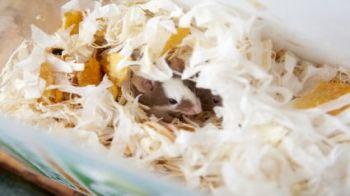Understanding mouse behaviour
Here's a handy checklist of what your pet mice need to stay healthy and happy and behave as they would in the wild.

They will need:
- Enough space in their home to keep them occupied while still allowing generous space for them to run around. Wild mice are extremely active animals, travelling many hundreds of metres in one day.
- Vertical and horizontal dividers in their cage - such as shelves and climbing facilities - to make it a more interesting space for them and give them the chance to move around confidently. Mice like to stay in physical contact with upright surfaces and can find barren open spaces stressful.
- To clean and groom themselves properly - otherwise they can get frustrated, and it can affect their ability to cope with their surroundings. Mice love grooming and spend a large proportion of their waking time doing it.
- To burrow - wild mice burrow and build complex tunnel systems. You can help them do this by giving them:
- Bedding material that's deep enough to allow them to burrow into the dark, but that doesn't totally stop you from being able to check on them
- Cardboard tubes with several exits, should be large enough that they can turn around without getting stuck and so that they can avoid any confrontation with cage mates.
- Peace and quiet - put your mouse cage somewhere quiet and undisturbed, away from the main activity of your home, so that they can rest and sleep during the day. Mice are active at dusk and dawn and throughout the night.
The main thing to remember is that while they're in their cage, your mice will need to be able to exercise, forage, play, interact calmly with their cage mates, climb, investigate and control their surroundings. Read more about creating a great home for mice.
It's important to keep a close eye on your mice and how they normally behave, as any change in their behaviour could be a sign that something's wrong. Learn more about mouse health and welfare.
Follow the links below for more advice on caring for your mice.


